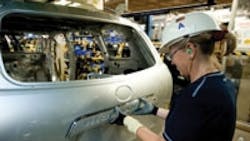Experts: Don't Blame Lean Manufacturing for Toyota's Problems
As Toyota Motor Corp. embarks on what many experts believe will be a long journey toward rebuilding its reputation for top quality, the company's status as the model for lean manufacturing also has come into question.
Did Toyota lose focus on core lean values such as continuous improvement? Did the company become too focused on lean? Is it possible, as some media reports have suggested, that Toyota's troubles exposed some faults inherent in lean manufacturing?
Lean and quality pundits debate the exact cause of Toyota's safety issues but seemingly agree that the concept of lean manufacturing was not the company's problem. Nothing in the Toyota recalls or hearings are related to lean manufacturing, wrote Jeffrey Liker, author of "The Toyota Way" and University of Michigan professor, in an e-mail. Simply put, "these are product engineering and communications issues," he said.
Lean's Role in Quality
Similarly, auto industry veteran engineer Frank Murdock says lean isn't necessarily more vulnerable to risk.
"However, just like anything else, when done superficially or incompletely lean processes can get you into big trouble," says Murdock, an adjunct professor of quality systems and project management at Lawrence Technological University in Southfield, Mich.
A Highlander SUV rolls down the line at the Toyota Motor Manufacturing plant in Princeton, Ind. The Highlander was one of several models impacted by the company's gas-pedal recall.
Murdock and several other experts weighed in on whether lean factored into Toyota's safety issues during an American Society for Quality Web conference on Feb. 22, just two days before Toyota President and CEO Akio Toyoda was scheduled to speak before Congress. In some instances lean can cause disruptions when companies try to cut waste by reducing safety stock, says Murdock, who worked 28 years as an engineer for Ford Motor Co. and is a senior ASQ member. That could spell trouble for a manufacturer that doesn't have predictable processes, he says.
It was suggested in a Feb. 13 Wall Street Journal article entitled "How Lean Manufacturing Can Backfire" that Toyota became too lean by standardizing parts across different models, setting itself up for a massive recall by repeating the defect in several product lines. But former ASQ president and auto industry veteran Ron Atkinson says the story missed the point of lean. "What I saw in The Wall Street Journal article was a misunderstanding of lean and what the intent of lean is," says Atkinson, who recently retired from General Motors. "Lean is not cutting costs. Lean is eliminating waste... and a tremendous waste is a recall."
Since a recall in itself is not lean, somewhere throughout Toyota's organizational structure it's likely lean was not applied properly, Atkinson says. Much of the focus on Toyota's problems has been on the company's engineering department.
Creating a Quality Culture
Toyota might have nipped the problem in the bud had quality assurance been extended to the engineering and design phases, suggests Randy Goodden, president and founder of the International Product Safety and Liability Prevention Association. Quality control is typically relegated to ensuring design specifications are met during and after the manufacturing process. But what if the product design is flawed?
"What happens in this scenario is quality is doing nothing more than assuring all customers that a product is built in compliance to the specification," Goodden says. "[Consequently], the specification itself ends up being defective." That means customers are almost assured to receive a defective product, Goodden says. "This is why I try to teach in everything that I do that I want the quality professional to stand back and ask the question, 'Who said the design was right to begin with?'" he says.
Departmental disconnects may have been compounded by the company's rapid growth, says Don Smith, senior consultant for Detroit-based Harbour Results Inc. Toyota may have lost focus on internal mentoring programs that are key to the company's management system and TPS, he says. Smith also questioned whether the Japanese culture of "saving face" and hoping the issue would go away played a role in Toyota's misfortunes.
See Also Akio Toyoda's Testimony to U.S. Congress
Foundation Shaken, Toyota Aims to Restore Credibility
All Toyota Brake Recall Articles
About the Author
Jonathan Katz
Former Managing Editor
Former Managing Editor Jon Katz covered leadership and strategy, tackling subjects such as lean manufacturing leadership, strategy development and deployment, corporate culture, corporate social responsibility, and growth strategies. As well, he provided news and analysis of successful companies in the chemical and energy industries, including oil and gas, renewable and alternative.
Jon worked as an intern for IndustryWeek before serving as a reporter for The Morning Journal and then as an associate editor for Penton Media’s Supply Chain Technology News.
Jon received his bachelor’s degree in Journalism from Kent State University and is a die-hard Cleveland sports fan.
